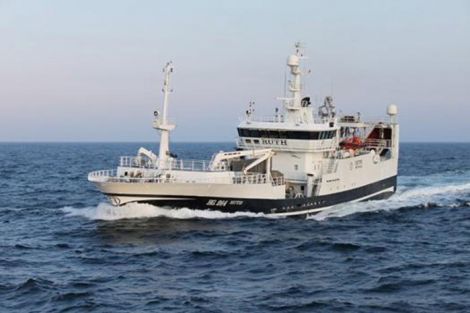News / Faroe mackerel claims swiftly denounced
DRASTIC increases in the Faroese quotas for mackerel and herring are needed to compensate for the collapse of the country’s whitefish industry, according to the industry.
A report published on Tuesday suggests that catches of more than 250,000 tonnes of mackerel and herring this year were necessary to support the island economy.
Scottish Fishermen’s Federation’s chief executive Bertie Armstrong immediately denounced the Faroese approach as “perverse and irresponsible”, saying there could be no justification for Faroe and Iceland’s unilateral quota increases.
Multinational talks over mackerel in the north east Atlantic collapsed in 2011 when Faroe and Iceland walked out of the negotiations to set their own catch limits.
Since then the stocks for all pelagic species fished in the region has been suffering from overfishing, leading to real concern over the valuable mackerel stock.
Writing in the Faroe Islands Newsletter, journalist Kári Mikkelsen said the islands’ economy depended on a stable fishing industry.
“In the last few years, the demersal (whitefish) fishing industry has experienced declining catches, and last year and so far this year the catches have been particularly small,” Mikkelson wrote.
“At the same time, the prices of demersal fish species like cod and haddock are historically low.
“It has therefore been vital for the Faroese economy that the quotas for the pelagic fish species – especially mackerel – have increased substantially, and that the catch for these fish species has been very good.”
In 2012, Faroese pelagic trawlers were unable to catch all their quota of 148,375 due to “capacity issues” which are reported to have now been overcome.
Faroe has this year further increased its mackerel quota at 159,000 tonnes.
Mikkelsen said: “In addition to this, the herring quota has been increased substantially so that the total quota for mackerel and herring will be 250,000 tonnes.
Become a member of Shetland News
“In the last few years, there has been strong disagreement about the division of the Total Allowable Catches (TACs), both when it comes to mackerel and herring.
“Faroese and Icelandic authorities maintain that their quotas have been too small in comparison to the large amounts of these fish species that exist in the sea around the Faroe Islands and Iceland.
“Therefore the countries have taken steps to determine their own quotas, and – like last year – the Faroese mackerel and herring quotas should be seen in this light.”
Armstrong said: “It seems a rather strange and perverse approach to fisheries management and sustainable catching to increase quotas for pelagic species so as to compensate for declines in demersal catches, as this article seems to suggest.
“The unilateral increases in mackerel imposed by the Faroese are quite astonishing – from 24,472 tonnes in 2004 to almost 150,000 tonnes in 2012.
“In addition, the Faroese have unilaterally increased their Atlanto-Scandian herring catch this year by more than three times the level agreed with the international management plan.
“There is absolutely no justification for such large increases and to operate outwith any kind of international management plan for pelagic species is grossly irresponsible and puts at risk the health of stocks that have been sustainably managed by other parties engaged in the fisheries.”
Become a member of Shetland News
Shetland News is asking its readers to consider paying for membership to get additional perks:
- Removal of third-party ads;
- Bookmark posts to read later;
- Exclusive curated weekly newsletter;
- Hide membership messages;
- Comments open for discussion.
If you appreciate what we do and feel strongly about impartial local journalism, then please become a member of Shetland News by either making a single payment, or setting up a monthly, quarterly or yearly subscription.




























































